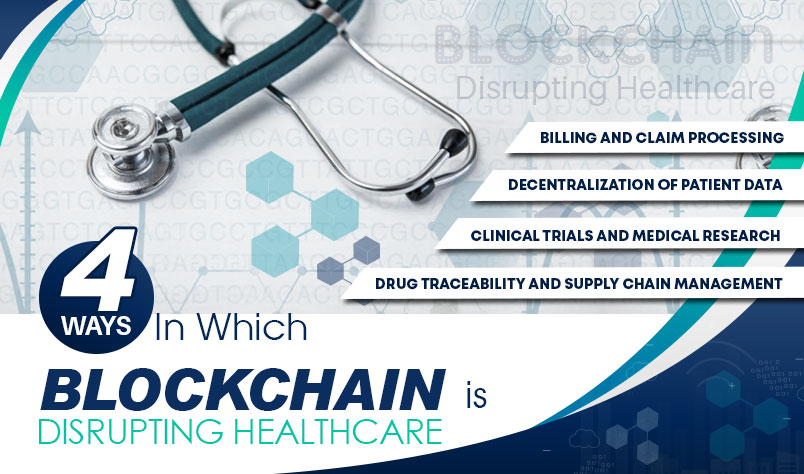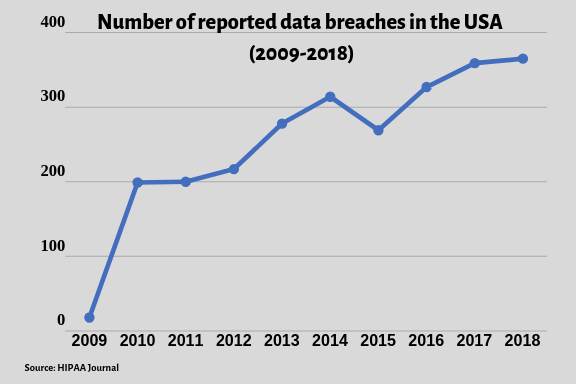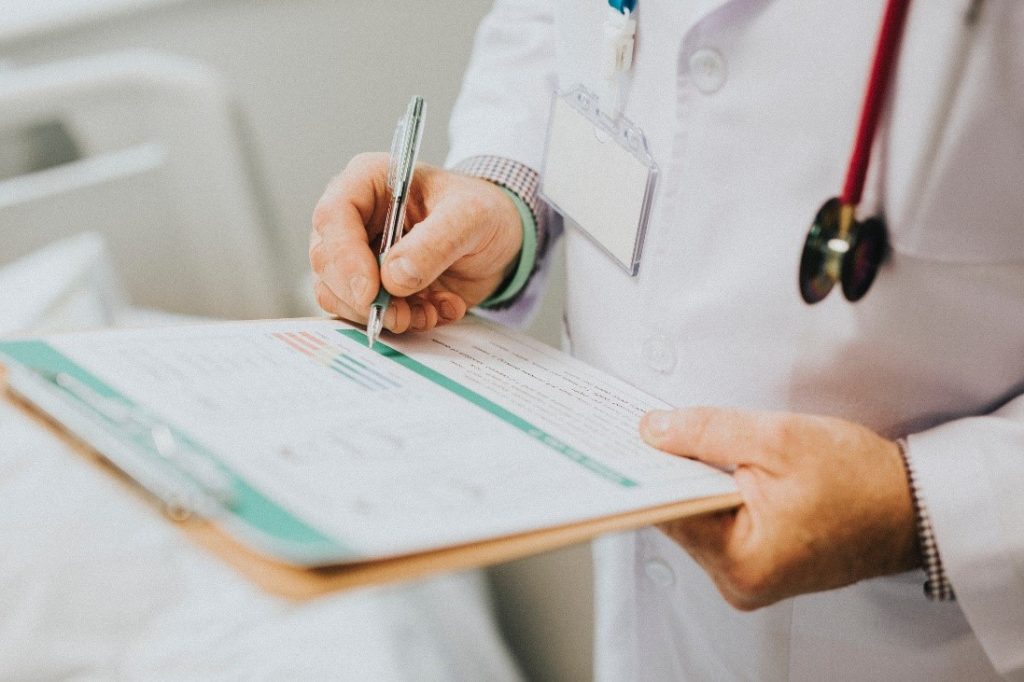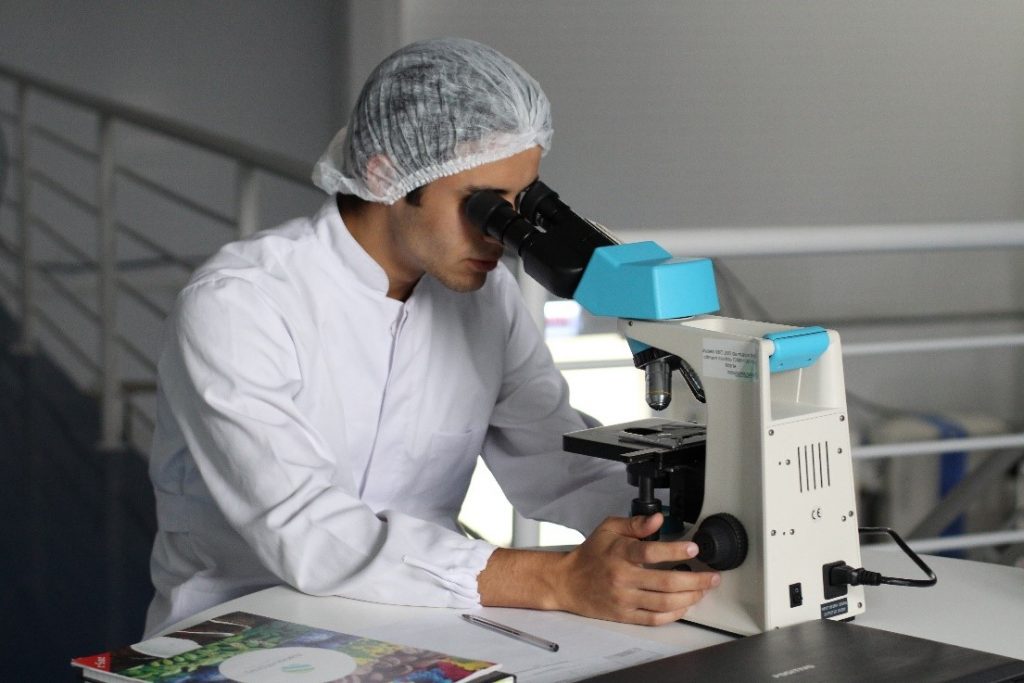Toggle navigation

“The people we want to attract are looking to solve a problem together, to help get in the fight against disease. It is not so much how much money you want to get back – people are in it for the altruism.”
Dawn Barry
Blockchain is the new kid on the block. Enterprises are adopting Blockchain solutions to bring transparency and efficiency in all facets of their business and healthcare industry is no exception. In fact, Blockchain is being regarded as the solution to the most pressing issues of ‘interoperability’ and ‘privacy’ in the healthcare space.
According to a report by Zion Market Research, Blockchain technology in healthcare will reach USD 1415 million by 2024. Read more.

Figure 1: Healthcare experts view Blockchain as a technology with tremendous disruptive potential
The healthcare industry has always been plagued with a slew of issues ranging from the exorbitant cost of treatment to inefficient business practices, constant data breaches and invasion of counterfeit products. While Blockchain cannot be a panacea for all these problems, it can certainly revolutionize the healthcare landscape.
Blockchain is a technology that creates an immutable record of transactions shared on a distributed peer-to-peer network. These transactions can be a movement of goods, currency or data. Blockchain technology comes with several noteworthy features:
1) Decentralization of Patient Data: Data security has always been a major issue in the healthcare space. In the USA alone, there have been more than 2500 healthcare data breaches between 2009 and 2018 resulting in the theft of 189 million healthcare records. Read more.

Keeping patient data secure is one of the key benefits offered by Blockchain.
Using Blockchain, a decentralized, incorruptible and transparent record of all patient data can be created.
Blockchain’s cryptographic hashing feature ensures no unauthorized user can access a patient’s record. If any user tries to do so, the Blockchain network gets notified immediately. The patient can pick and choose what documents he wants to share with other users on the Blockchain network.

A decentralized database solves another key problem faced by the healthcare ecosystem i.e. interoperability. Doctors, pharmacists, laboratories and other healthcare experts can seamlessly exchange and share a patient’s historical and real-time data. No need to reconcile data each time. No need to maintain paper records.
Information regarding procedures, diagnoses and prescriptions of a patient can be added to the database over time. Authorized parties can retrieve this information as needed.
Patients typically have access to only a sliver of their medical record. With Blockchain, the patient can access his medical history over a period of time and get a holistic picture of his health. Healthcare experts can leverage this information for an in-depth diagnosis of the patient and address risk factors on time.

Figure 2: Blockchain can help secure and organize patient data
Medicalchain, for instance, is a healthcare Blockchain that aims to securely record and transfer patient data. Different parties in the healthcare ecosystem like doctors, laboratories, pharmacists and insurers can have time-limited access to any patient’s health record.
Doctors write the prescription, laboratories provide test results, pharmacies dispense medication; all these get recorded as transactions on the Blockchain. Any user, such as an insurer, can access these transactions for a limited time and verify the record of a patient.
Medicalchain allows patients to be in full control of their database. Patients can provide varying levels of access to different users so that only authorized users can read or add data to a patient’s record. The patients can also decide what documents a particular user can access and for what time.
Medicalchain ecosystem uses Medtokens for making payments. Doctors are paid in tokens for answering patients’ queries, hospitals are paid in tokens for their services. Computer operators on the network are also given tokens for maintaining the digital ledger.
Medicalchain also allows patients to share their health data with clinical research institutes in exchange for Medtokens.
Patients have clear information on how their data is being used and what all data would be required. Often, the patients choose to remain anonymous.
Medicalchain has also released an app MyClinic.com, a cross-border telemedicine platform that allows patients to have a video consultation with their doctor and pay using Medtokens. Read more.
2) Clinical Trials and Medical Research: Pharmaceutical companies carry out clinical trials to test the efficacy of drugs developed and proposed for curing a specific illness. The drug is tested under a set of controlled conditions. If the results are satisfactory, large-scale manufacture is carried out.

Figure 3: Blockchain can provide impetus to clinical research
However, many companies have been found to hide or modify research reports which do not show favorable results. For instance, if a pharmaceutical company manufactures a drug which research has found to have significant side effects, it may try to hide the report.
According to an estimate, a staggering 50% of the clinical trials go unreported.
Blockchain technology provides a platform for recording secure, unbiased and transparent clinical trials.
Using a Blockchain, all the documents involved in the trial such as research design, informed consent and study protocol can be time-stamped (i.e. have proof and details of their creation time) and stored on the network as smart contracts. These documents can be accessed as needed.
Since every document has proof and details of its creation time, no user can tamper with the outcome of the clinical trial.
The results of the trial get stored on Blockchain and can be accessed by a number of healthcare experts. This improved accessibility paves way for better, more reliable research.
Bringing all documents on the Blockchain also reduces audit costs, lost document issues and frauds.
Blockchain also makes it convenient for researchers to enroll participants for any kind of trial.
For reliable results, researchers need a large number of participants who are willing to share their medical records and undergo tests as required.
Blockchain allows research participants to share their records while remaining anonymous. It also ensures that the researchers adhere to the protocol and do not share participant details with any unauthorized party.
Participants can track how their data is being used during the course of the trial and communicate with the researcher whenever needed. They can be awarded incentives in the form of tokens.
Nebula Genomics, a Boston based Blockchain development company is using the technology to build a genetic marketplace. The company offers free genome sequencing to individuals willing to share their genetic information with researchers.
Individuals willing to share information answer questions related to their medical history, medication, level of physical activity etc. and earn Nebula credits in return.
Research companies review this information and select specific users to provide genomic sequencing at subsidized rates. In exchange, the companies get to access the results of sequencing that can be used to develop certain drugs or improve the treatment of an illness.
Yet another Blockchain startup LunaDNA offers users its shares in exchange for different types of genomic and health data. For example, a user can receive LunaDNA shares for sharing the genomic sequencing of a tumor or data from wearable devices.
The compensation will be commensurate with the quality of information shared. Shareholders will occasionally receive dividends.
However, unlike Nebula Genomics the company does not offer any kind of genetic service. So the user will need to upload results of genetic tests from sources like 23andMe and Ancestory.com. The information shall be kept anonymous. Besides, a user can delete his data from the platform any time he wishes.
In the words of Dawn Barry, one of the co-founders at LunaDNA:
“The people we want to attract are looking to solve a problem together, to help get in the fight against disease. It is not so much how much money you want to get back – people are in it for the altruism.”
3) Billing and Claim Processing: Healthcare industry has a slow, complex and inefficient back-end. Billing and insurance-related costs are a big burden on the industry.

Figure 4: Blockchain can speed up billing and claim processing in healthcare
The industry is rife with examples where the patient is billed for services not provided or where the patient is not clear about the cost of treatment and ends up paying a much higher bill than expected.
The solution lies in leveraging Blockchain platform to create smart contracts where every transaction related to the service received by a patient would be stored and updated on the network. This means all relevant documents, all the tests performed, all medicine provided, all terms and conditions related to the treatment would be stored on the Blockchain network.
Since all the transactions are available on the Blockchain and are immutable, the patient can track the entire treatment from beginning to end and pay only for the services he actually availed. He can assure that no unnecessary charges are levied on him.
Blockchain can also speed up claim processing in medical insurance.
Claim processing in healthcare has always been a cumbersome process. It involves several middlemen, many complex procedures and reconciliation of patient data at each stage.
Insurance providers need to verify the services a patient has availed. Doctors and even patients have to crosscheck the invoices multiple times to ensure there are no errors in billing.
Several healthcare companies have moved to Blockchain platforms to facilitate claim processing.
PokitDok which got acquired by Change Healthcare in December 2018 is an important example in this regard. PokitDok is a platform-as-a-service company which provides APIs that facilitate several processes involved in healthcare claim processing such as eligibility checks, claims submissions, patient identity management and payment optimization.
The platform has been used by hospitals, healthcare startups and telehealth companies to streamline workflow, reduce the cost of operations, and discover valuable insights. Read more.
4) Drug Traceability and Supply Chain Management: Counterfeit drugs are a menace in the healthcare industry. According to a report by World Health Organization, approximately 10 percent of drugs in any developing country are not genuine. While counterfeit drugs cause pharma companies to lose millions, they can cause severe side-effects or even death when consumed.

Figure 5: Blockchain can improve drug traceability in healthcare supply chains
Bringing medical supply chain on Blockchain can help tackle this issue. A decentralized, immutable cryptographically secure Blockchain can help trace the drug right from its origin in the laboratory till the time it reaches the shelves in pharmacies.
Since these Blockchains need to be shielded from malicious parties, a private Blockchain where the control is in the hands of a reliable central authority can be a suitable option. The authority will decide which laboratories, manufacturers, wholesalers or retailers will become a part of the Blockchain.
Different users on this Blockchain-powered supply chain can be given different accessibility options e.g. Laboratories can register drugs; wholesalers and retailers can verify transactions.
Every transaction in this supply chain remains time-stamped and immutable. When the drug moves along the chain, it can be easily tracked. Improved traceability ensures no counterfeit product enters the system along the entire path of the supply chain.
Chronicled, a California-based Blockchain development company provides Blockchain and IoT enabled solutions to supply chains. These solutions aim to secure and automate the supply chain ecosystem.
In 2017, Chronicled launched the MediLedger Project to track and trace medical supply chains. The project brings drug manufacturers, wholesalers and retailers on a decentralized supply chain powered by Blockchain.
The Blockchain technology will help verify the authenticity of raw materials and drugs, and prevent counterfeit products from entering the supply chain. It will also manage payment contract terms.
The project has built a permissioned Blockchain where only authorized parties can access any information.
The MediLedger Project also aims to help healthcare companies achieve compliance with the Drug Supply Chain Security Act (DSCSA).
Another instance in this regard is Blockpharma which has developed a Blockchain-based drug traceability solution.
Blockpharma’s mobile app helps a consumer trace the origin of any drug he buys and thus prevents him from consuming any counterfeit medicine. The app uses machine learning technology to improve the detection of counterfeit drugs. Read more.
Though the Healthcare industry has seen many pilot Blockchain projects over the last few months, acceptance of Blockchain will take time. Blockchain is costly and healthcare players need to build an infrastructure that supports Blockchain solutions. Then there are speculations about its cultural adoption.
Regardless, healthcare experts are experimenting with Blockchain to develop innovative applications, many of which have begun to show results. We at Cyfuture, therefore, have every reason to believe that Blockchain will disrupt the healthcare landscape for sure.
Good article published. Giving all the necessary information. Thanks for sharing.
Hi, Thanks for sharing this post. Here Lots of great information regarding Clinical research and it is very useful for people who are searching for this type of services. Our professionals apply their clinical operation services in oncology clinical trial for biosimilar clinical development. We are specialized in managing patient recruitment and retention, clinical study data management, pharmaceutical data management, clinical Biostatistics, and Programming. For more information visit below given link:–
https://www.abiogenesisclinpharm.com/clinical-operations-services
A beautiful piece on how blockchain will evolve the clinical research industry. I learnt a lot from this blog. Looking forward to more blogs.
A beautiful piece on how blockchain will evolve the clinical research industry. I learnt a lot from this blog. Looking forward to more blogs
Clinical research is a study conducted to understand health and diseases in the particular human body. It is branch of healthcare that governs the safety and effectiveness of medications, diagnostic products, devices, and treatment procedures proposed for human use.
http://www.fusiontechnology.in/clinical-research-course-in-pune.php
Great Post. Thanks for sharing